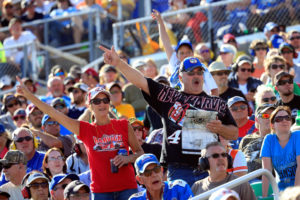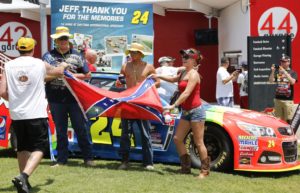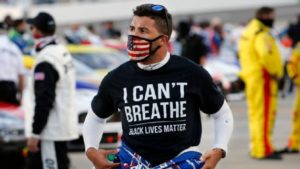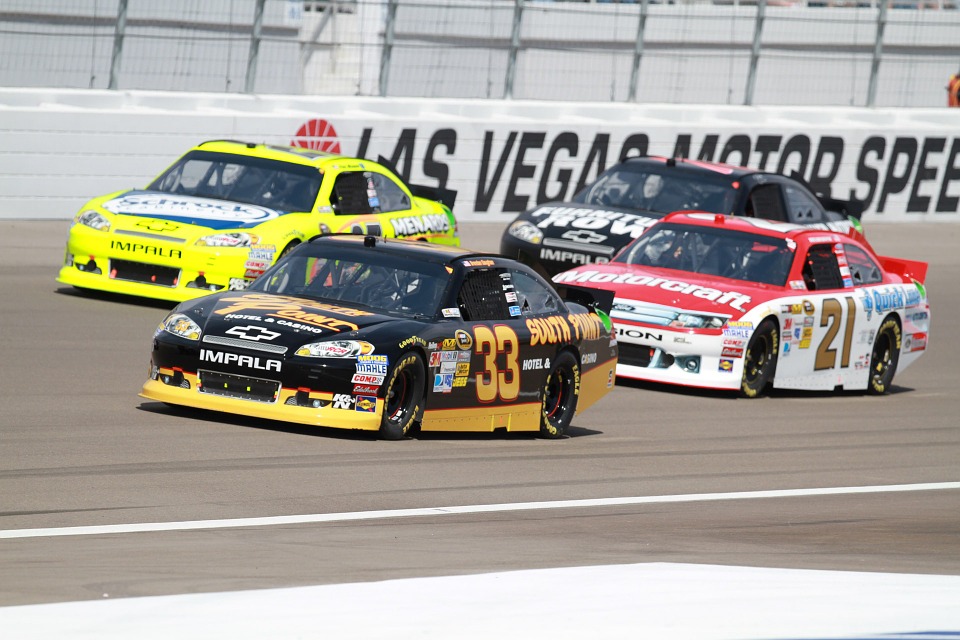There are some things that many describe as being all-American. NASCAR is one of them. Fans were delighted when former President George W. Bush attended the Daytona 500. Donald Trump also followed the tradition of attending the grand event.
The political scene in America is entwined with burning social and cultural issues. The pop culture scene is a major part of all this. It affects American politics too, as fans are likely to be of the same mindset and belief systems. Let’s take a look at some different theories.
Fan loyalty theories and political party affiliations

There’s a fan loyalty theory that says fans follow the party that their favorite NASCAR drivers support. Since many of these drivers say that they support the Republican Party, their fans follow suit. This micro- and macro-influencer concept stretches across all mediums.
NASCAR fans that support Republican candidates place their preference, keeping in mind a few primary issues that are critical for them. These subjects include gay rights and abortion, namely anti-abortion, and anti-gay marriage stances. Some groups within this larger demographic care a lot about the death penalty, gun rights, and affirmative action. Other factors might be at play with their decision making, of course; however, the NASCAR element is prominent and influential.
Another theory speculates that NASCAR fans see Democratic candidates as being the ideals of Hollywood. It means that they see such candidates not believing in hard work and only cashing in on manipulative luck. On the other hand, they see Republican candidates as being relatable individuals and part of the old traditions. From this perspective, these qualities make them better and more dependable candidates in the eyes of many NASCAR fans.
While the Democratic Party might be more supportive of the middle and lower classes, we’ve seen blue-collar fans of NASCAR who continue to support the Republicans. Some speculate that there is a lot of overlap and close connections. Statista reports indicate facts and figures on viewership held all across the United States, as well as in Canada, Japan, Mexico, and Australia, as a part of NASCAR’s new global initiative
Historic alignment
The association between NASCAR and conservative politicians has been a long one. As such, politicians continue to establish their link to stock car racing in general. The founder of NASCAR, Bill France, has given a lot of public support to conservative candidates. Several members of his family and business associated followed suit.

The trend of welcoming conservative candidates to drive one of the cars, make a speech, or publicly appear at one of the race weekends is widely apparent. In short, the target market for NASCAR happens to be the same as the Republican Party supporters, at least many of them. It was here that a political movement and a sports brand came together to form a synergistic marriage.
In many ways, a NASCAR race resembles a political rally. It even had a role in promoting the Confederate flag up until recently. The flag has now been banned from NASCAR events. But this step is also creating a lot of backlash from its supporters.
Until the ban, NASCAR and several racetrack owners had close partnerships with vendors who sold Confederate merchandise and memorabilia. The flag would fly from recreational vehicles, on fan’s clothing, and even waved by spectators at the races.
Cultural shift

Today, it seems like there is a cultural shift in racing and NASCAR in particular. This shift started before the official ban of the Confederate flag. For a few years now, we’ve seen NASCAR officials try to make the sport and its events more diverse and inclusive. They’ve encouraged women, ethnic minorities, and racial minorities to enter the sport.
There is a Drive for Diversity program launched in 2004. This program gears toward helping out minorities and women who want to pursue their career within NASCAR. “The program brings minorities to the sport at a faster and more encompassing rate.” Whether this opportunity is as a driver or part of the pit crew, the support was and still is there. Darrel Wallace, a driver in NASCAR, nicknamed ‘Bubba,’ is a graduate of this diversity program and later initiated the flag ban.
The link to American politics doesn’t end there. Wallace later made history by driving a car with a paint scheme supporting the Black Lives Matter civil rights movement. Other people, like Wallace, are dismantling the cultural fixtures and nudging changes in this sport. They’re making it diverse in many ways. Besides the gender and racial diversity, there’s now a growing movement for political diversity and beliefs in NASCAR.
The takeaway
“Reaching out to people who otherwise wouldn’t so much as even care for the sport. That is integral for the growth of this sport, because it will never stop growing and never stop evolving.” The connection between NASCAR and American politics is robust, as is the case with anything significant in pop culture. With mainstream access to lobbyists, celebrities, influencers, social media platforms, more organizations consider the political ramifications and reactions of their fan base. NASCAR is one of these organizations, already linked to American politics through the fabric of history. The changes might appear slow and subtle. However, they’re present and accelerating. With that, look to see the Drive for Diversity and NASCAR management continue the role it plays in NASCAR’s future for many years to come.


